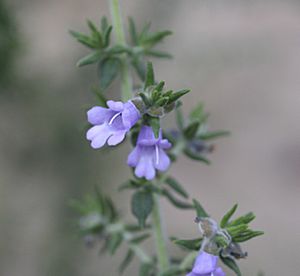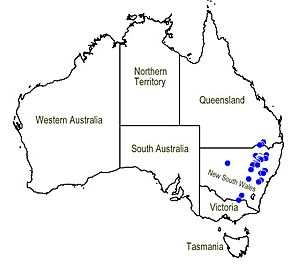Granite mintbush facts for kids
Quick facts for kids Granite mintbush |
|
|---|---|
 |
|
| Near the Sandstone Caves in the Pilliga forest | |
| Scientific classification | |
| Genus: |
Prostanthera
|
| Species: |
granitica
|
 |
|
| Occurrence data from AVH | |
The granite mintbush (scientific name: Prostanthera granitica) is a beautiful flowering plant. It belongs to the Lamiaceae family, which includes many mint plants. This special shrub is found only in eastern Australia. It grows as a spreading bush with unique egg-shaped leaves. Its flowers are usually purple or violet.
What Does It Look Like?
The granite mintbush is a spreading shrub. It usually grows about 0.6 to 1 meter (2 to 3 feet) tall. It can spread up to 2 meters (6.5 feet) wide. Its branches are covered with many tiny hairs.
The leaves are light green and also hairy. They are shaped like an egg. Their edges are often rolled under. Each leaf is about 6 to 15 millimeters long. They are also 2 to 5 millimeters wide. Some leaves attach directly to the stem. Others have a very short stalk, less than 1 millimeter long.
The flowers grow one by one. They appear where the leaves meet the stem. Small leaf-like parts, called bracteoles, are found at the flower's base. These are about 2 millimeters long.
The flower has five sepals, which are like small leaves protecting the bud. They are about 5 millimeters long. These sepals form a tube about 3 millimeters wide. This tube has two lobes, with the top one being 2 millimeters long. The petals are usually purple or mid-violet. Sometimes, they can be white. They are about 8 to 10 millimeters long. You can see these lovely flowers from August to December.
Who Discovered This Plant?
The granite mintbush was first officially described in 1905. Two scientists, Joseph Maiden and Ernst Betche, gave it its scientific name. They published their findings in a scientific paper. This paper was called the Proceedings of the Linnean Society of New South Wales.
Where Does It Grow?
The granite mintbush grows in rocky areas. You can find it in both heathlands and forests. It is mainly found in the tablelands, slopes, and plains of New South Wales, Australia.

